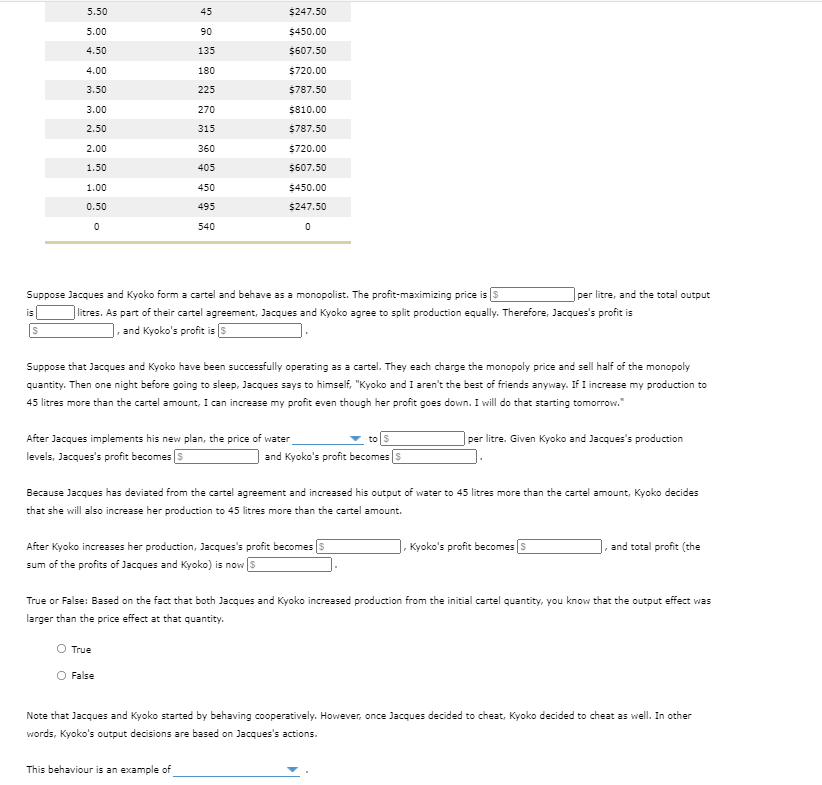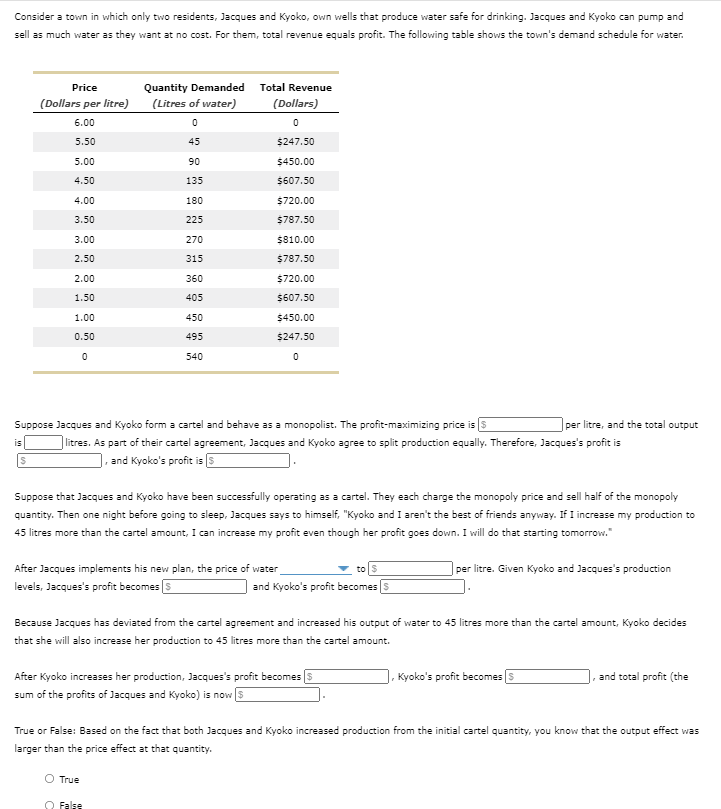Consider a town in which only two residents, Jacques and Kyoko, own wells that produce water safe for drinking. Jacques and Kyoko can pump and sell as much water as they want at no cost. For them, total revenue equals profit. The following table shows the town's demand schedule for water. fill in every blank!! NOTE: options for first
Consider a town in which only two residents, Jacques and Kyoko, own wells that produce water safe for drinking. Jacques and Kyoko can pump and sell as much water as they want at no cost. For them, total revenue equals profit. The following table shows the town's demand schedule for water. fill in every blank!! NOTE: options for first
Managerial Economics: Applications, Strategies and Tactics (MindTap Course List)
14th Edition
ISBN:9781305506381
Author:James R. McGuigan, R. Charles Moyer, Frederick H.deB. Harris
Publisher:James R. McGuigan, R. Charles Moyer, Frederick H.deB. Harris
Chapter3: Demand Analysis
Section: Chapter Questions
Problem 9E
Related questions
Question
Consider a town in which only two residents, Jacques and Kyoko, own wells that produce water safe for drinking. Jacques and Kyoko can pump and sell as much water as they want at no cost. For them, total revenue equals profit. The following table shows the town's demand schedule for water.
fill in every blank!!
NOTE: options for first drop down question is (decreases or increases)
options for second drop down question is (tying, a tit for tat strategy, a dominant strategy, a prisioners dilemma)

Transcribed Image Text:5.50
45
$247.50
5.00
90
$450.00
4.50
135
$607.50
4.00
180
$720.00
3.50
225
$787.50
3.00
270
$810.00
2.50
315
$787.50
2.00
360
$720.00
1.50
405
$607.50
1.00
450
$450.00
0.50
495
$247.50
540
Suppose Jacques and Kyoko form a cartel and behave as a monopolist. The profit-maximizing price is 5
per litre, and the total output
is
litres. As part of their cartel agreement, Jacques and Kyoko agree to split production equally. Therefore, Jacques's profit is
and Kyoko's profit is S
Suppose that Jacques and Kyoko have been successfully operating as a cartel. They each charge the monopoly price and sell half of the monopoly
quantity. Then one night before going to sleep, Jacques says to himself, "Kyoko and I aren't the best of friends anyway. If I increase my production to
45 litres more than the cartel amount, I can increase my profit even though her profit goes down. I will do that starting tomorrow."
After Jacques implements his new plan, the price of water
to $
per litre. Given Kyoko and Jacques's production
levels, Jacques's profit becomes
and Kyoko's profit becomes S
Because Jacques has deviated from the cartel agreement and increased his output of water to 45 litres more than the cartel amount, Kyoko decides
that she will also increase her production to 45 litres more than the cartel amount.
After Kyoko increases her production, Jacques's profit becomes s
sum of the profits of Jacques and Kyoko) is now5
Kyoko's profit becomes 5
and total profit (the
True or False: Based on the fact that both Jacques and Kyoko increased production from the initial cartel quantity, you know that the output effect was
larger than the price effect at that quantity.
O True
O False
Note that Jacques and Kyoko started by behaving cooperatively. However, once Jacques decided to cheat, Kyoko decided to cheat as well. In other
words, Kyoko's output decisions are based on Jacques's actions.
This behaviour is an example of

Transcribed Image Text:Consider a town in which only two residents, Jacques and Kyoko, own wells that produce water safe for drinking. Jacques and Kyoko can pump and
sell as much water as they want at no cost. For them, total revenue equals profit. The following table shows the town's demand schedule for water.
Price
Quantity Demanded
Total Revenue
(Dollars per litre)
(Litres of water)
(Dollars)
6.00
5.50
45
$247.50
5.00
90
$450.00
4.50
135
$607.50
4.00
180
$720.00
3.50
225
$787.50
3.00
270
$810.00
2.50
315
$787.50
2.00
360
$720.00
1.50
405
$607.50
1.00
450
$450.00
0.50
495
$247.50
540
Suppose Jacques and Kyoko form a cartel and behave as a monopolist. The profit-maximizing price is s
per litre, and the total output
|litres. As part of their cartel agreement, Jacques and Kyoko agree to split production equally. Therefore, Jacques's profit is
|, and Kyoko's profit is s
is
Suppose that Jacques and Kyoko have been successfully operating as a cartel. They each charge the monopoly price and sell half of the monopoly
quantity. Then one night before going to sleep, Jacques says to himself, "Kyoko and I aren't the best of friends anyway. If I increase my production to
45 litres more than the cartel amount, I can increase my profit even though her profit goes down. I will do that starting tomorrow."
After Jacques implements his new plan, the price of water
levels, Jacques's profit becomes 5
to
per litre. Given Kyoko and Jacques's production
and Kyoko's profit becomes s
Because Jacques has deviated from the cartel agreement and increased his output of water to 45 litres more than the cartel amount, Kyoko decides
that she will also increase her production to 45 litres more than the cartel amount.
After Kyoko increases her production, Jacques's profit becomes
Kyoko's profit becomes s
and total profit (the
sum of the profits of Jacques and Kyoko) is now 5
True or False: Based on the fact that both Jacques and Kyoko increased production from the initial cartel quantity, you know that the output effect was
larger than the price effect at that quantity.
O True
O False
Expert Solution
This question has been solved!
Explore an expertly crafted, step-by-step solution for a thorough understanding of key concepts.
This is a popular solution!
Trending now
This is a popular solution!
Step by step
Solved in 2 steps with 2 images

Knowledge Booster
Learn more about
Need a deep-dive on the concept behind this application? Look no further. Learn more about this topic, economics and related others by exploring similar questions and additional content below.Recommended textbooks for you

Managerial Economics: Applications, Strategies an…
Economics
ISBN:
9781305506381
Author:
James R. McGuigan, R. Charles Moyer, Frederick H.deB. Harris
Publisher:
Cengage Learning

Essentials of Economics (MindTap Course List)
Economics
ISBN:
9781337091992
Author:
N. Gregory Mankiw
Publisher:
Cengage Learning

Managerial Economics: A Problem Solving Approach
Economics
ISBN:
9781337106665
Author:
Luke M. Froeb, Brian T. McCann, Michael R. Ward, Mike Shor
Publisher:
Cengage Learning

Managerial Economics: Applications, Strategies an…
Economics
ISBN:
9781305506381
Author:
James R. McGuigan, R. Charles Moyer, Frederick H.deB. Harris
Publisher:
Cengage Learning

Essentials of Economics (MindTap Course List)
Economics
ISBN:
9781337091992
Author:
N. Gregory Mankiw
Publisher:
Cengage Learning

Managerial Economics: A Problem Solving Approach
Economics
ISBN:
9781337106665
Author:
Luke M. Froeb, Brian T. McCann, Michael R. Ward, Mike Shor
Publisher:
Cengage Learning
